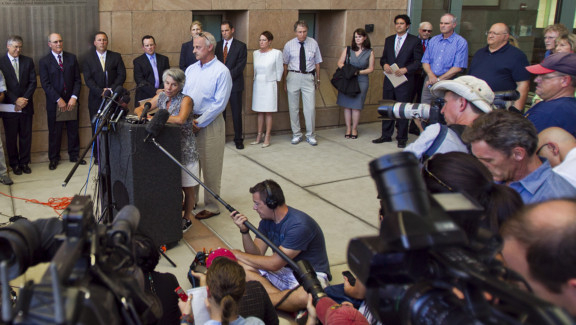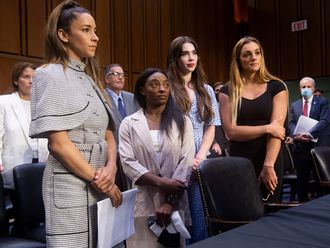
TUCSON, Arizona: The suspect in a shooting that left a US congresswoman wounded pleaded guilty to going on the rampage that killed six other people. The plea spares Jared Lee Loughner the death penalty in an attack that gained worldwide attention.
The plea came on Tuesday soon after a federal judge had found that months of forcibly medicating Loughner to treat his schizophrenia had made the 23-year-old college dropout competent to understand the gravity of the charges against him and assist in his defence.
Gabrielle Giffords, the congresswoman who was the intended target, continues to recover from the January 2011 shooting at an Arizona political gathering. She has left her Congress post.
Among the dead were Arizona’s chief federal judge and a Giffords’ aide. Twelve other people aside from Giffords were wounded.
“I plead guilty,” Loughner said.
He faces life in prison without the possibility of parole.
The outcome was welcomed by some victims, including Giffords, as a way to avoid a lengthy, possibly traumatic trial and years of legal wrangling over a death sentence.
“The pain and loss caused by the events of Jan. 8, 2011, are incalculable,” Giffords said in a joint statement with her husband, Mark Kelly. “Avoiding a trial will allow us - and we hope the whole Southern Arizona community - to continue with our recovery.”
His hair closely cropped, Loughner was not the smiling, bald-headed suspect captured in a mugshot soon after the shooting.
Wearing khakis, Loughner sat quietly throughout the hearing and smiled at one point when a psychologist testifying about his competence remarked that he had bonded with one of the federal prison guards.
After the hearing, Loughner’s parents cried and embraced. The victims mostly just watched without expression.
“He’s a different person in his appearance and his affect than the first time I laid eyes on him,” said Judge Larry A. Burns, who then accepted the plea agreement and added that he found it to be in the best interest of everyone involved.
Ron Barber, a former Giffords staffer who was wounded in the attack and later won election to her seat after she stepped down, said he hoped the plea will help the victims and their families “move forward and continue our healing process.”
“I truly believe that justice was done today,” he said after the hearing. “It is important to me that this individual never again is in a position in which he can cause harm to anyone else.”
Susan Hileman, who accompanied slain 9-year-old Christina-Taylor Green to the gathering outside a supermarket and was wounded in the attack, said nothing would return her life to what it was before the shooting.
“This is so sad -a 23-year-old who’s going to spend the rest of his life in a box. I feel empty. What I want, I can’t have,” she said, adding that she was relieved the case ended. Still, “it’s like a Band-Aid that keeps getting ripped off.”
Experts had concluded that Loughner suffers from schizophrenia, and officials at a federal prison have forcibly medicated him with psychotropic drugs for more than a year.
Court-appointed psychologist Christina Pietz testified for an hour about how she believes Loughner became competent. Loughner listened calmly without expression. His arms were crossed over his stomach, lurched slightly forward and looking straight at Pietz.
A plea agreement offers something for both sides, said Quin Denvir, a California defence attorney who has worked with Loughner attorney Judy Clarke on the case against unabomber Ted Kaczynski, who is serving life in prison for killing three people and injuring 23 during a nationwide bombing spree between 1978 and 1995.
Prosecutors would avoid a potentially lengthy and costly trial and appeal, knowing that the defendant will be locked up for life. Clarke managed to avoid the death penalty for other high-profile clients such as Kaczynski and Eric Rudolph, who bombed abortion clinics in the late 1990s and Atlanta’s Olympic park in 1996.
The top prosecutor in southern Arizona’s Pima County said last year that she may file state charges in the case that could carry the death penalty. An official in the prosecutor’s office, Amelia Craig Cramer, declined to comment, saying the office did not have an active prosecution against Loughner.
Denvir said it was possible that the plea agreement calls for the state to avoid pursuing criminal charges against Loughner, though that’s not a given.
“Ideally (as a defence attorney) you’d like to have it resolved all at once, but sometimes you have to take one at a time,” he said.
The decision to spare Loughner a federal death sentence makes sense, said Dale Baich, a federal public defender in Phoenix who handles capital case appeals and isn’t involved in the case.
“As time went on and there were numerous evaluations, I think everybody had a better understanding of Mr. Loughner’s mental illness.” Baich said.
He added: “It appears that he will need to be treated for the rest of his life in order to remain competent.”












